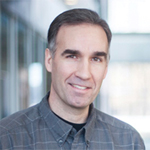about
our people

Christopher J. Kucharik
Lead Principal Investigator
Professor
Department of Agronomy, College of Agricultural and Life Sciences &
Nelson Institute Center for Sustainability and the Global Environment
research areas: Scenarios, Groundwater and Agriculture, Water Quality, Urban Heat Island

Kucharik’s research program is largely interdisciplinary, incorporating field work on cropping systems ecology and ecosystem modeling in a framework that is geared towards understanding the impacts of climate change and land management on ecosystem goods and services. The U.S. Department of Agriculture, the National Science Foundation (NSF), the U.S. Department of Energy (DOE), and the Wisconsin DNR support his current research projects. The current scope of his research centers on the impacts of climate change and land management on water and energy balance in the Yahara Watershed and the Central Sands regions of Wisconsin; the carbon sequestration potential of bioenergy cropping systems across the Midwest US; and the effects of landscape patterns on soybean aphid populations in southern and central Wisconsin, and impacts on soybean productivity.
Kucharik’s faculty position is part of the Wisconsin Energy Institute (WEI), and he has affiliate appointments with the Center for Integrated Agricultural Systems (CIAS), the Department of Atmospheric and Oceanic Sciences, Agroecology, the Center for Climatic Research, and Freshwater and Marine Sciences (FMS). He is a member of the Science Council for the Wisconsin Initiative on Climate Change Impacts (WICCI), serves as co-chair for the WICCI Climate and Agriculture Working Groups, and is an active member of the WICCI Central Sands Hydrology working group. He is also part of the Great Lakes Bioenergy Research Center (GLBRC), focusing on sustainability issues related to bioenergy production.
Kucharik serves as the lead PI on the WSC grant and as overall project manager, facilitating communication among all personnel working on the project. His primary project responsibilities are: (1) leading Agro-IBIS / THMB model development and testing, supervising a post-doctoral scientist and graduate student as part of this work; (2) collaborating on the coupling of the MODFLOW groundwater model to the core Agro-IBIS model; (3) supporting the effort to establish continuous monitoring of air temperature and humidity within the watershed as part of the Urban Heat Island study (supervising a graduate student); (4) leading and coordinating outreach efforts for the development of the “Water Walk,” as well as partnerships with Edgewood College and Wisconsin Public Television.
He earned a B.S. and a Ph.D. in Atmospheric and Oceanic Sciences (minor, Soil Science) from UW-Madison.


